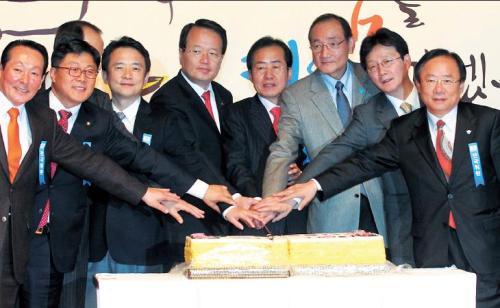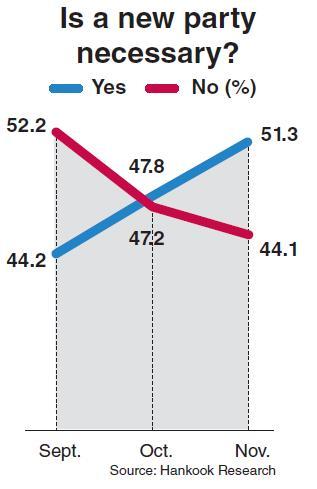 |
Top officials of the ruling Grand National Party cut a cake during a ceremony commemorating its 14th anniversary last week. (Yonhap News) |
Regrouping attempts more diversified than ever ahead of two key elections in 2012
In a recent meeting with reporters, former presidential candidate Lee Hoi-chang was active in addressing a range of issues that have recently gripped political circles.
Lee said Ahn Cheol-soo, an entrepreneur-turned-professor rising as a potential presidential runner, should show more of his hand, and that a Buddhist monk considered one of Ahn’s mentors should stop talking about politics and return to the sanctuary.
The justice-turned-politician also rebuffed a move to form a centrist party encompassing both conservatives and liberals as “grandiose but absurd.”
But Lee, who led a minor conservative party for years until May, refused to say whether he would support Rep. Park Geun-hye of the ruling Grand National Party in next year’s presidential election.
Many political observers feel there was still one more issue that should have been raised in their talks ― the prospect of an initiative to launch an expanded liberal opposition party by mid-December.
With parliamentary and presidential elections drawing near, political circles are abuzz with speculation on the realignment of parties and the formation of new groups.
It has become a familiar scene in Korea for political forces to regroup ahead of major elections in an attempt to enhance their chances of winning ― or just surviving.
Some presidential candidates have left the parties they had been affiliated with to form new ones, which they argued were needed to put into practice their v
 |
Representatives from opposition parties and civic groups attend a meeting to discuss forming an expanded liberal party earlier this month. (Yonhap News) |
ision and policies. During his first bid for presidency in 1997, Lee dismantled the then-ruling New Korea Party, which had nominated him as its presidential runner, to launch the GNP in a move to sever ties with President Kim Young-sam, who was unpopular with the public. Kim had refused to leave the NKP, despite demands he do so to help Lee’s presidential bid.
After losing the 1997 and 2002 presidential races to liberal contenders Kim Dae-jung and Roh Moo-hyun, respectively, Lee announced his retirement from politics and left the GNP.
But Lee changed his mind and made his third unsuccessful challenge for presidency in 2007 as an independent. He then launched the Liberty Forward Party to secure a political foothold in the central Chungcheong region in the 2008 parliamentary election.
More complications
Including the two parties formed by Lee, a total of 132 political parties have appeared here since the South Korean government was founded in 1948, three years after the Korean Peninsula was liberated from Japanese colonial rule, according to the National Election Commission.
The GNP, which marked its 14th anniversary last week, is the oldest existing party.
Political realignment in the lead-up to next year’s crucial elections will be more complicated than previous cases, analysts say, with stakes being higher as the parliamentary and presidential polls are taking place in the same year for the first time in two decades.
Voters’ growing disillusionment with established politics and the spreading of nonpartisan sentiment are pushing the parties to be more aggressive toward political regrouping.
In a poll of 1,000 likely voters in Seoul last month, 33.2 percent defined themselves as nonpartisan, while 36.8 percent and 21.2 percent supported the GNP and the main opposition Democratic Party, respectively. Nonpartisans accounted for the largest portion of the respondents in their 20s-40s.
“In the past, there used to be one pivotal move to redraw the political configuration but now we see a diversification of streams toward realignment,” said Jeong Han-wool, head of the Center for Public Opinion Research at the East Asia Institute.
What is becoming the focus of attention from both the conservative and liberal camps is whether Ahn, who has been ahead of other potential presidential candidates in recent polls, will move to form his own party.
With the 49-year-old professor remaining tight-lipped over his entry into politics, speculations are rampant over what he will do following his recent announcement to donate a large chunk of his wealth to society, which further boosted his approval rating.
Some of his associates have suggested Ahn will take a step toward launching a new party.
Ven. Beopryun, considered one of key mentors of the professor, last week hinted at the possibility of a new political group joined by Ahn being launched before next April’s parliamentary election.
The Buddhist monk said calls for a new party would mount if the established parties continued to fail to accommodate public wishes for better livelihoods.
Former lawmaker Kim Jong-in, who has advised Ahn, said in a recent interview with a local weekly that a new party is needed to offer voters more options.
Observers see that if formed, Ahn’s party will aim to transcend the long-standing ideological confrontation between conservatives and liberals, attracting nonpartisan voters.
But liberal opposition forces, who want Ahn to join a planned party encompassing them, see little chance of the professor moving to create his own party.
“Doesn’t it sound unrealistic for Ahn to form a third party on his own?” said Moon Jae-in, former chief secretary to late President Roh, who has led efforts to merge opposition groups into a single party.
“It would be better for him to join forces with us,” he said.
Analysts note that Ahn, if he considers running in the December 2012 presidential election, may have a different political agenda than opposition politicians, who wish to use his popularity with young voters to boost their prospects of winning the upcoming parliamentary election. Ahn may decide on his course of action after seeing the political realignment set up and the outcome of the parliamentary poll.
Shin Yul, professor of political science at Myongji University, said political aspirants around Ahn may be pushing to launch a new party without his involvement as a foothold for their bids for a parliamentary seat.

Support for third party
Another initiative to form a new party is being staged by former GNP lawmaker Park Se-il, who has led a conservative think tank. He is aiming to encompass both reformist conservatives and moderate liberals into the fold of his envisioned party.
But some aides to Park Geun-hye are doubtful about the move, which they suspect may be designed to shake the ruling party and derail her presidential bid.
Public sentiment in favor of a third party has been growing, reflecting voters’ disenchantment with existing parties.
In a nationwide poll of 800 adults conducted by Hankook Research over the weekend, more than 51 percent of respondents wanted to see a new party to be launched, compared to 44.2 percent in September and 47.8 percent in October.
DP leaders appear to be settling their discord over the party’s merger with a political force grouping associates of Roh and other liberal civic and labor groups.
Old guards of the party have objected to DP chairman Sohn Hak-kyu’s plan to launch the merged party in a convention joined by all participating forces next month, arguing a new DP leadership should be formed before pushing for the merger. Many observers see the party’s old guards led by Rep. Park Jie-won fear that they may lose their vested interests in its stronghold of the southwestern Jeolla region.
Sohn and Park recently agreed on a compromise under which the DP and other groups declare their merger by Dec. 17 as planned but pick up the merged party’s leadership in January. Park is expected to compete with former Prime Minister Han Myeong-sook for its top post with Sohn set to step down as DP leader to prepare for his presidential bid.
Minor progressive parties have refused to join the merged party, moving to achieve their own integration. The Democratic Labor Party, the People’s Participatory Party and a group of deserters from the New Progressive Party plan to launch their merged party in mid-December.
Observers note that the two expanded groups are expected to field joint candidates in the parliamentary elections and join together under a single presidential candidate.
Unpredictable politics
After its candidate lost to a nonpartisan civic activist in the Seoul mayoral by-election last month, some GNP lawmakers called for creating a new party around former party chairwoman Park Geun-hye. But Park has since said regaining public trust with new policies should come before any attempt to revamp the party. Political observers note Park may not want to become completely estranged from President Lee Myung-bak, wishing not to follow in the footsteps of former GNP presidential candidate Lee Hoi-chang who lost in the 1997 election after breaking off with then-President Kim.
But some analysts see the possibility of the factions led by Park and President Lee being antagonized against each other in the course of nominating candidates for next April’s parliamentary election. They also note GNP lawmakers close to Lee may seek to support another presidential candidate and bolt from the party.

Critics say the parties to emerge from the ongoing political realignment would be little different from the existing ones. They note it is not desirable to use the merger of parties only as a tool to enhance the prospect of election win.
If they join a newly merged opposition party, DP leader Sohn and its Supreme Council member Chung Dong-young will have changed their party affiliation for the seventh and eighth time, respectively. Former Prime Minister Lee Hae-chan, who also plans to join the party, would have his 10th party affiliation.
Jeong of the EAI indicated the complicated political realignment was causing a situation that makes ordinary voters feel weary and unstable, exacerbating the uncertainty of politics.
“In terms of political stability and predictability, the ongoing regrouping attempts are far from desirable,” he said.
By Kim Kyung-ho
(
khkim@heraldcorp.com)







![[Herald Interview] 'Trump will use tariffs as first line of defense for American manufacturing'](http://res.heraldm.com/phpwas/restmb_idxmake.php?idx=644&simg=/content/image/2024/11/26/20241126050017_0.jpg)


![[Health and care] Getting cancer young: Why cancer isn’t just an older person’s battle](http://res.heraldm.com/phpwas/restmb_idxmake.php?idx=644&simg=/content/image/2024/11/26/20241126050043_0.jpg)
